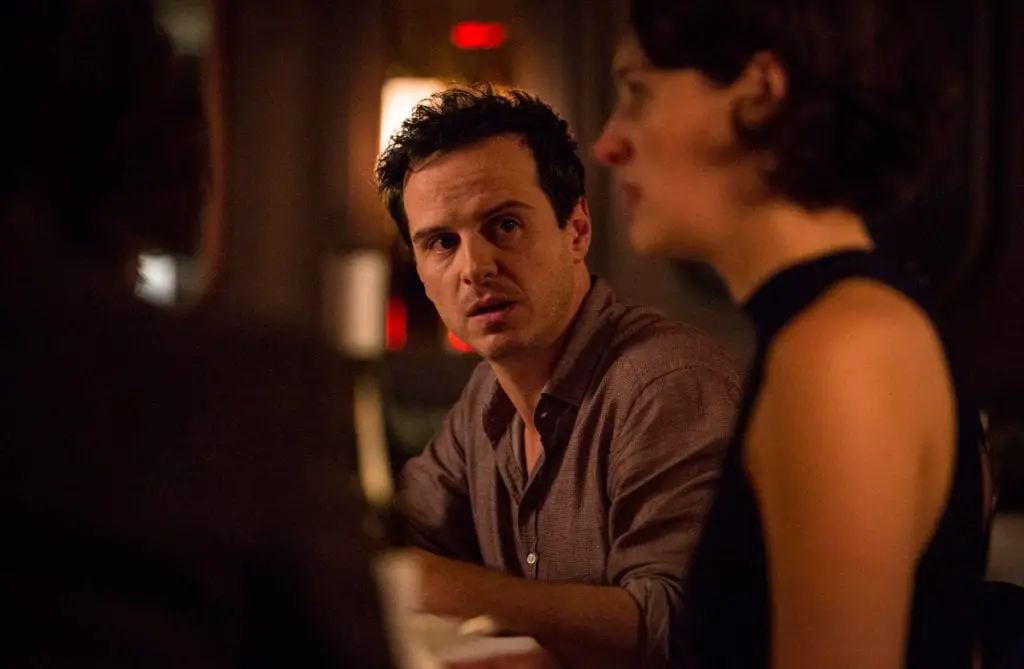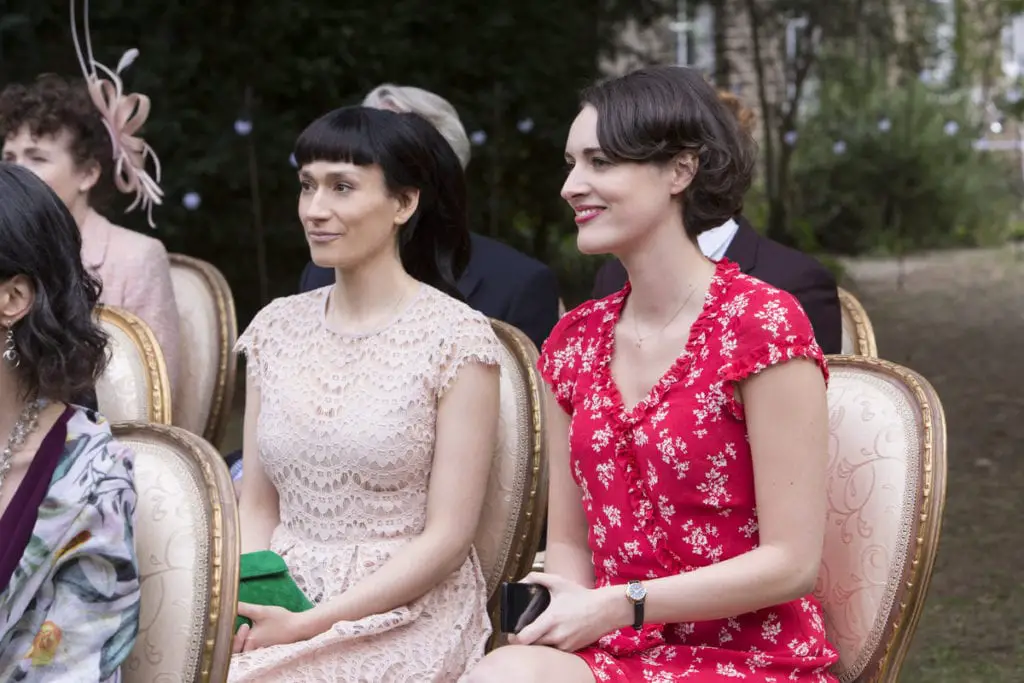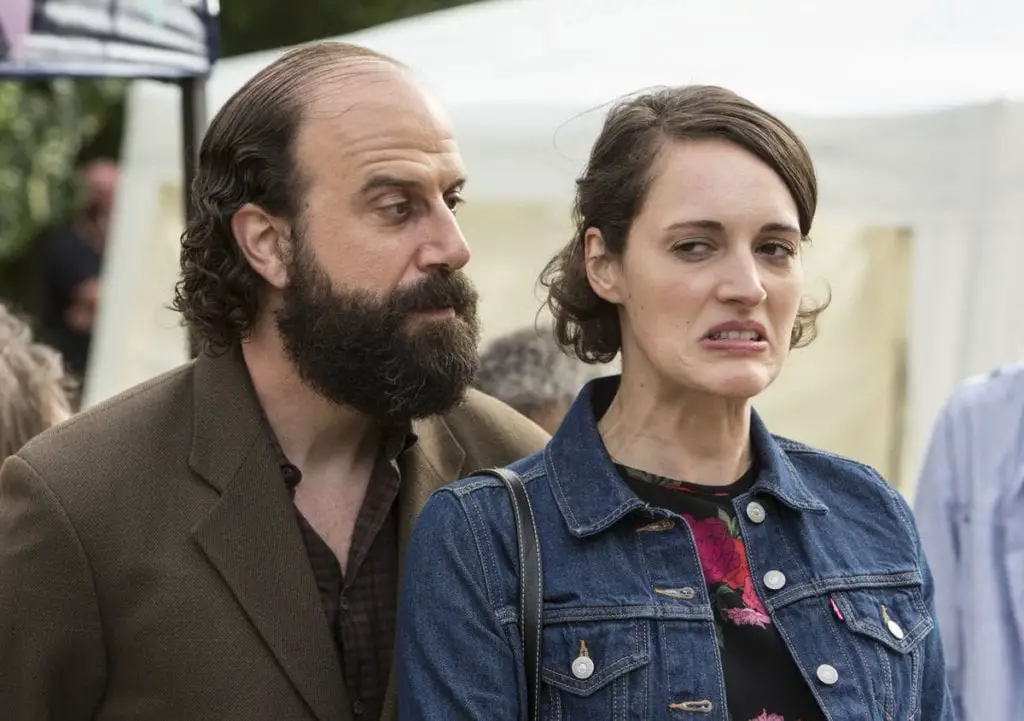Despite the inquisitive nature of that headline, I’m not questioning whether Fleabag is an instant classic, because it’s not a question. Season 2 of Fleabag immediately earned its place among the best seasons of a comedy in recent memory. It takes everything the first season did right and doubles down on it. It corrects most of the flaws and plays around with the others. Everything about Fleabag improves from one season to the next.
Still, as I sat down to start writing my gushing thoughts about the show, the question remained; what exactly made Fleabag’s second season so much better than its first? What exactly makes it so special? Why did this season, even more than the first, make for such memorable television?

The Relationships
While Fleabag’s first season certainly had fun with its titular character’s relationships, especially her relationship with her uptight sister Claire, the focus overwhelmingly centered on Fleabag herself. She features in every scene. Her friends and family were supporting pieces in her path of grief-fueled self-destruction. Entertaining pieces, for sure, but the season predominantly focused on Fleabag’s solo grieving process. Namely, the way her grief left her alone by the end.
Season 2 took the framework, and especially the self-destruction of those relationships, and improved every facet of them.
This stands out most in the central relationship of the season, the one Fleabag develops with The Priest. Yes, that’s his “name.” We’re introduced to him at the same time Fleabag herself is, at a family dinner. There’s an instant spark. After the first season, most of us expect her attraction to him to go much the same as her flings during the first season. He’s a fun distraction, someone to use until it gets boring and she moves along.
Instead, she finds someone who understands her entirely. The result is a stunningly effective romance beyond anything I ever expected. The Priest perfectly mirrors Fleabag in many ways. Their conversations endlessly establish the ways he sees her that no one else does. He has undergone the same experiences. They’re stunningly similar people. In many ways it feels like The Priest has already come out the other side of the journey Fleabag still undergoes. Or maybe he still struggles through his version of the journey.
He sees her with a shocking clarity that tears apart the illusions Fleabag uses to hide herself and her grief from the world.
It makes for one of the best romances in recent television memory and a perfect example of how Fleabag expanded beyond the laser focus on its titular character. Season 2 was one of relationships, and did truly tremendous things with them.
The same way the first season showed an outstanding eye for the intricacies of a single person’s struggles, the second season shows the same eye for the complex ebbs and flows of two people’s interactions. It goes beyond romance and The Priest. Whether it’s sisterhood, parents, friends, whatever, the second season excels at the intricacies of a pair of people.
Besides The Priest, this is most evident in Fleabag’s relationship with her sister, Claire. You can’t find two people more dissimilar. Where Fleabag is eccentric, braggadocios, antagonistic, and uninhibited, Claire is a neurotic, repressed, pushover of a mess. As you’d expect, they constantly clash. However, neither is more loyal to anyone than they are to each other.
Season 2 expands and improves even this strong point of the first season by growing their relationship and Claire’s character. Instead of the more static role as Fleabag’s opposite and a source of insecurity, Claire herself undergoes significant change in her personal and professional life. We see how Fleabag also adds to Claire’s insecurities. From episode to episode you will change how you feel about them. Claire will scream at her sister for being so effortlessly charming in one moment and call her in wild panic about a haircut in the next.
Sometimes it feels like they need each other to stay sane and healthy. Other times it feels like they would be better off never seeing each other again.
The resulting added depth to their relationship makes for one of the best sibling relationships you’ll ever see on TV, one perfectly capturing that thin line siblings often straddle between obligated loyalty and true familial affection. It really doesn’t get much better. When Fleabag calls season 2 a love story, she does not refer only to The Priest. It’s also a story of two sisters reaffirming their love. Even if they often hate each other.
Add in Fleabag’s constant warring with her father, godmother-turned-stepmother, and brother-in-law, and the way she comes to various resolutions with each, and the second season perfectly captures the way our relationships dominate our lives. It’s a marked improvement on the first season. That’s incredible to say, but true. You won’t find many shows that understand how people affect each other better than Fleabag.

The Shattered Walls
Probably the most recognizable gimmick of Fleabag’s storytelling is how its main character talks to the camera. It’s a familiar fourth-wall-breaking trick. Fleabag distinguished itself a bit with the debate regarding who exactly she talks to. Is it the audience? Those she grieves, whether it’s her friend Boo or her mother? Is she speaking to herself?
The second season, like with everything else, expands upon this concept in interesting ways through her relationship with The Priest. We take for granted that her comments to us are some secret gimmick only we see. You don’t think much about it. This was nothing more than a way to deliver jokes.
Then something interesting happens. Fleabag turns to the camera to say something funny, as usual, and The Priest notices. He glimpses into this private world, the first to do so.
Suddenly the game changes. We have to reexamine exactly what is happening when Fleabag speaks to the camera. It’s no longer a funny TV trick, it’s a commentary on Fleabag’s life and her reliance on this invisible world to hide truths about herself. Is this good for her? What exactly is she doing? The Priest’s ability to view this secret tells us what kind of life he has lived and why Fleabag becomes interested in him.
The question only becomes more pressing as The Priest grows increasingly aware of the trick and calls her out on it. Then something especially interesting happens; when the two have sex, Fleabag pushes the camera away so we can’t see. To say that’s uncommon understates things. After all, we see basically every other sexual encounter the woman has. What makes this one different? What about her relationship with The Priest makes her not rely on the camera like she always does? How does The Priest alleviate the need to escape manifested in her fourth-wall breaking?
It’s a simple thing, but it elevates Fleabag beyond the expected. We’re drawn into the show so much more than you expect from a comedy. When this ultimately culminates in Fleabag asking the camera not to follow her at the end of the season, it feels like a perfect ending point. We came into her life in at her low point. Now she’s ready to move on, and we’re no longer privy to her inner thoughts. She doesn’t need us anymore.
The thing is, that’s good. We validate unhealthy life choices by being there for her. She doesn’t have to face reality because she can retreat to the world she shares with us.
We’re left wondering whether we truly know her, or if we only know this version of her. Does she only show us a crafted persona, the same way she does most people in her life? What secrets does she keep from us? For so long we feel like we’re the only ones who truly understand who Fleabag is, only to realize we don’t.
The relationship with The Priest succeeds so well in large part because he sees through to the real her in ways we can’t. He sees a truth we don’t. Perhaps you could say we each see a part of her, and only by combining us can you feel a true understanding of Fleabag. Perhaps it’s no coincidence that Fleabag lets us go at the same time The Priest lets her go.
There’s something special and unique about the way Fleabag draws the audience into the show and then lets us go. We undergo a journey, just like the characters. I feel satisfied not just for Fleabag or the other characters. I feel satisfied for the journey I undertook and my role in it.
How many shows can you say that about?
The Absolutely Perfect Awareness
Season 2’s work with Fleabag’s camera conversations was probably the best example of one of the most important strengths any show can have; a perfect awareness of itself and how best to take advantage of it.
Every show must find some way to manage the outside influence of the audience pointing out its habits. We comment, we meme, we interact with creators on social media. Any long-term storytelling (TV, comics, manga, etc.) is a fluid creation simply because audiences have a chance to react to your choices as they are made. Interact too much and take social media too much to heart, and it adversely affects your show. Ignore it and you miss your mistakes.
Fleabag certainly had its idiosyncrasies coming out of the first season. Strengths, arguable weaknesses, habits that needed to be improved, built upon, or eliminated entirely. Talking to the audience, for example, or Fleabag’s promiscuity, or her interactions with the world around her. Some of these things were excellent and only needed to be expanded upon. Fleabag showed an excellent eye for identifying its strengths and weaknesses.
Even better, it showed an excellent eye for which beats to repeat or not. Fleabag’s continued struggles to make her café work could have continued into season 2. Instead it starts off a success. She could have continued to her uninhibited behavior. Instead she tries to restrain it, to varying degrees of success. The first season’s underlying pessimism and misery could have increased, much the way It’s Always Sunny in Philadelphia made its cast into worse people with each new season.
Fleabag could have made a perfectly fun second season this way. Stick to what worked and give us more of the same. What made the second season more, into something truly special, was how perfectly aware they were of what to change and what not to change to make something so much better.
I think the best example of how they managed this balance came with Claire. I already talked about the excellence of how Fleabag excelled with its titular character’s relationship with her sister, but they did just as good a job with Claire individually. The first season establishes Claire as the antithesis of her sister. She falls comfortably into the uptight neurotic overachiever stereotype, there to make Fleabag feel insecure and bounce jokes off of.
If this continued into the second season, it would have worked. I’d have been happy. Instead they broke down the things making Claire into the person she was. Just like Fleabag, she was allowed to become something better, or at least start the path that way. Her habits and failings were confronted. The pressure she felt to stay in her marriage, the restraints she places on her goals and dreams, and especially the struggles of her relationship with her sister were all touched upon in greater detail and shifted away from the familiar dynamics of the first season.
Not entirely, because too drastic a move risks just as much as moving too little, but the movement is there and fully to the benefit of the show. She perfectly represents how Fleabag took risks with its setup to create genuine movement worth returning for.

At the same time, the second season somehow knew exactly which of the familiar beats to continue into the second season. My favorite involves a sculpture Fleabag steals from her overbearingly passive-aggressive godmother/soon-to-be-stepmother. It was my favorite running gag of the first season, as this sculpture travels from hand to hand, situation to situation, while all the time everyone involved knows exactly who took the statue yet pretend otherwise.
Then the second season ramps the joke up. After a mishap involving an award presentation, Fleabag brings this sculpture to present instead. Then she has no choice but to chase down the recipient and beg for it back, leading to a bar scene among the very best of the season.
It all comes to a head in the finale, when Fleabag gifts the sculpture back to her godmother as a wedding gift. She means it as a peace offering, a way for everyone to move on. Then her godmother tells her the sculpture was based on Fleabag’s mother. It’s a surprising, poignant way to take this joke and add an appreciated layer to her inability to stop stealing it throughout the show, something beyond petty rebellion.
Especially when, as Fleabag waves a final goodbye to the camera, asking us to no longer follow, we see that she stole the sculpture yet again. It’s the perfect way to end the best running joke in the show.
Knowing exactly what to let go and what not to speaks to the larger vision Phoebe Waller-Bridges has for this series and why she bothered to make a second season at all. Look up the reviews for Fleabag’s first season and you’ll find a quite common opinion among them; that the first season was a perfect loop in no need of a second season. For most fans, a second season was a giant risk. Even Waller-Bridges originally intended only one season.
Thankfully for us, she found more to say. That more became a basically perfect season of television. If the day comes where she decides a third season is worth making, we need only look at the second to know it will be worth our time. This is a creator with a firm idea of what she wanted from these characters and we were the benefit of it.
Images courtesy of BBC America

